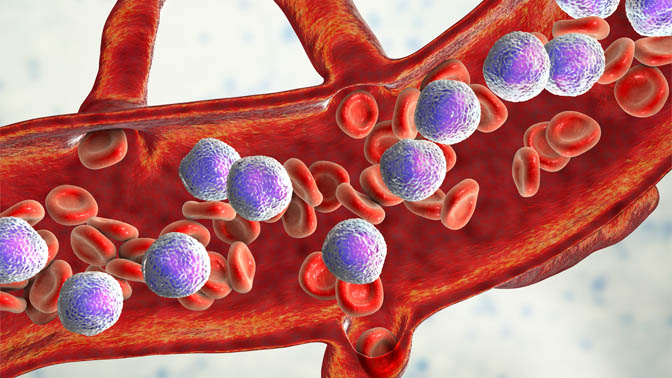
Acute myeloid leukemia (AML) is a cancer of the blood cells. Almost three out of four of adults with AML die within five years of being diagnosed with the disease, so there is a great need for new ways to treat it.
One emerging approach is to use a subset of cells from the immune system called DNT cells to target and kill the mal-formed blood cells produced by the disease. The DNT cells can be extracted from patients or from healthy donors, multiplied outside the body, and given to patients with AML as a therapy. Early results with this DNT cell-based therapy have been promising, however some cancer cells from AML patients are not successfully targeted by the DNT cell therapy.
A team led by Senior Scientists Dr. Housheng Hansen He at Princess Margaret and Dr. Li Zhang at Toronto General Hospital looked for genetic differences that would explain why some patients don’t respond to DNT cell therapy.
Their study used a powerful tool called CRISPR to edit the genes in AML cell samples. In an experimental model, they made changes to 1,000 genes at a time, and then tested whether the therapeutic T-cells were able to target the cancer.
Using this approach, the team identified a group of genes—which are components of the SAGA deubiquitinating complex—as important for enabling AML cells resistance to T-cell therapy. These genes have many functions, but their ability to make changes to proteins that bind to a cell’s DNA may be important for treatment resistance.
The team was also able to identify genes that can serve as markers for whether the cancer would respond to DNT cell therapy. “We found that when a protein known as the CD64 was expressed on the cancer cells, they were effectively targeted and killed by DNT cells. Likewise, when CD64 was absent, the cancer was resistant to the therapy,” says Dr. Zhang.
These findings provide important first steps towards optimizing DNT cell therapy and for predicting whether the therapy will help individual patients. Future clinical trials will test whether CD64 can be used to identify the individuals with AML that are most likely to benefit from DNT cell therapy, while basic research studies are needed to explore the role of the SAGA complex in therapy resistance and how to target it.
This work was supported by the Canadian Cancer Society, the Canadian Institutes of Health Research, the Ontario Ministry of Colleges and Universities, and The Princess Margaret Cancer Foundation. Dr. He holds the Joey and Toby Tanenbaum Brazilian Ball Chair in Prostate Cancer.
Fraser Soares, Branson Chen, Jong Bok Lee, Musaddeque Ahmed, Dalam Ly, Enoch Tin, Hyeonjeong Kang, Yong Zeng, Nayeema Akhtar, Mark D Minden, Housheng Hansen He, Li Zhang. CRISPR screen identifies genes that sensitize AML cells to double negative T cell therapy. Blood. 2020 Dec 3. doi: 10.1182/blood.2019004108




